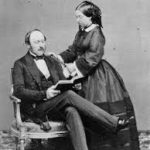
Albert as a young man.
This post is courtesy Joan Thomas, Rare Books Cataloger at the Center for the History of Medicine at the Francis A. Countway Library of Medicine of Harvard Medical School.
On December 14th, 1861, Prince Albert of Saxe-Coburg and Gotha, husband of Queen Victoria, succumbed to a lingering illness that doctors diagnosed as typhoid fever. There has been speculation that Albert may in fact have died of Crohn’s disease or ulcerative colitis, both of which involve the debilitating stomach pain from which he suffered. In an article entitled, “The death of Albert Prince Consort: the case against typhoid fever” (QJM. 86 (12) 1993: 837–841), J.W. Paulley argues as follows:
“That he had been intermittently unwell with abdominal symptoms for several months before the terminal stage of his illness, only 9 days after this sensitive and vulnerable man was confronted by an intensely personal insult, lends further support to a diagnosis of inflammatory bowel disease.”

Albert and Victoria.
The ”intensely personal insult” Paulley mentions was the Prince of Wales’ liaison with an Irish actress, Nellie Clifden, and the widespread rumors of blackmail and pregnancy. The stress resulting from such an embarrassing situation may have been the catalyst for the Albert’s final illness. Paulley concludes that “[s]ome patients with fulminating inflammatory bowel disease, if that is what the Prince had, decline such help, preferring to brood rather than speak, and take their bottled-up feelings of resentment to the grave.”





